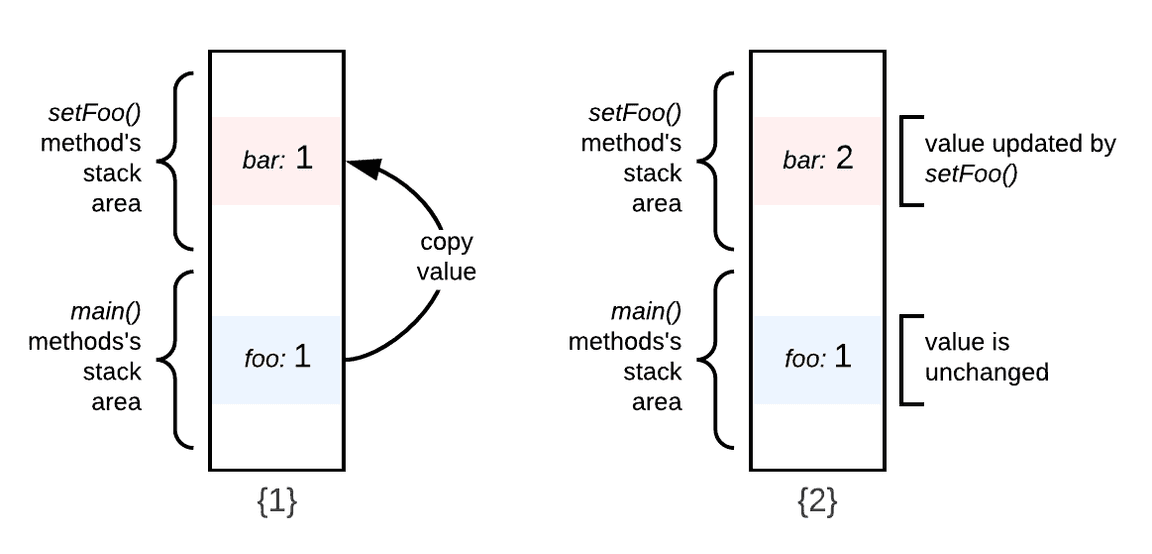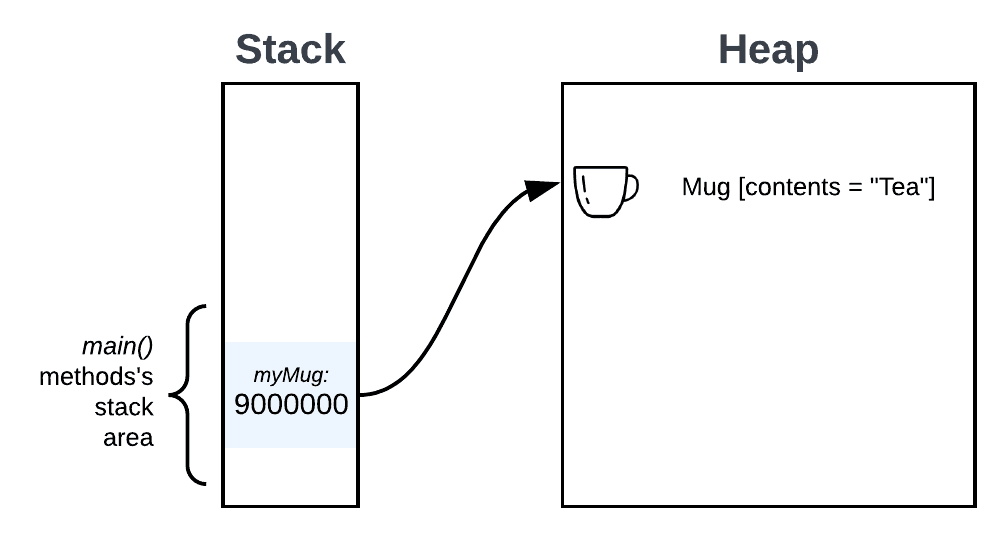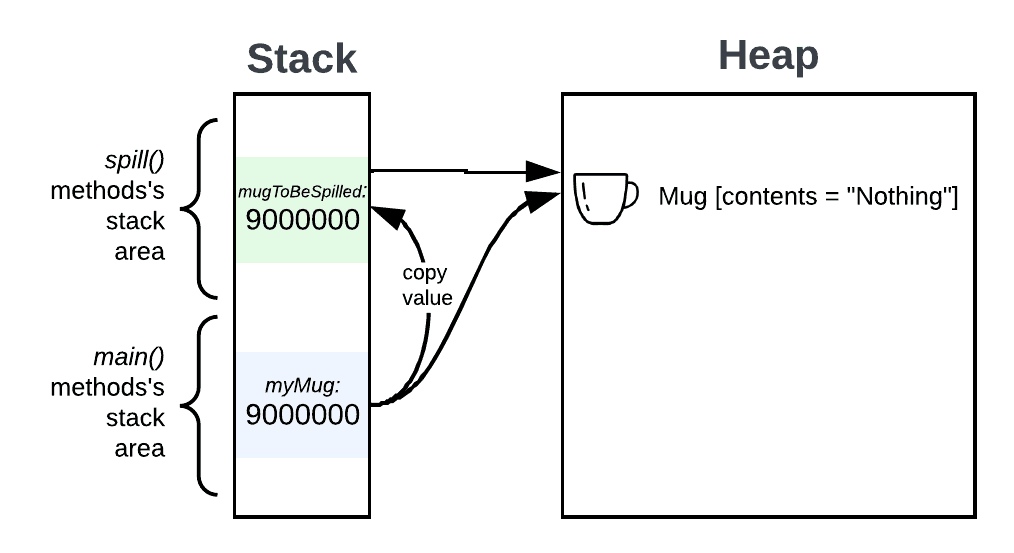Is Java Pass-By-Reference or Pass-By-Value?

Lewis D.
—The ProblemThe Problem
A simple Google search of this question will return a straightforward answer that Java is always pass-by-value. The reason this question is confusing is because Java achieves its functionality using special variable types known as object references.
The SolutionThe Solution
Before we continue, let’s briefly define the terms pass-by-reference and pass-by-value:
- Pass-by-reference: When a method is called, the method arguments reference the same variable in memory as the caller.
- Pass-by-value: When a method is called, the caller passes a copy of the argument variables to the method resulting in two values in memory.
Let’s look at these concepts more closely with the code snippet below:
public class Mug { private String contents; public Mug(String contents) { this.contents = contents; } public void setContents(String contents) { this.contents = contents; } public String getContents(){ return contents; } } public class Run { public static void spill(Mug myMug) { myMug.setContents("nothing"); } public static void main(String args[]) { Mug myMug = new Mug("tea"); // myMug contains "tea" System.out.println(myMug.getContents()); spill(myMug); // myMug now contains "nothing" System.out.println(myMug.getContents()); } }
In example above, the contents of the Mug object are manipulated in a way that is functionally very similar to a native pass-by-reference system. However, there is a key difference that is explained by the mechanism of storing non-primitive variable types in Java.
PrimitivesPrimitives
Primitive types in Java, such as char, int, and boolean, are passed-by-value in the purest sense of the term.
Consider the code snippet below:
public class Run { public static void main(String args[]){ int foo = 13; System.out.println(foo); // this will print "1" setFoo(foo); System.out.println(foo); // this will still print "1" } public static void setFoo(int bar){ bar = 2; } }
When the primitive int type foo is passed, it results in two separate int variables on the stack, foo and bar, like this:
Calling
setFoo()will create a copy offoo’s value inside the variablebarand place this on the stack.Then,
setFoo()updatesbestNum’s value to2without modifyingfoo’s value.
Non-PrimitivesNon-Primitives
Non-primitive types in Java – that is, objects – are accessed by object references. An object reference is a unique identifier that tells the compiler where to find the referenced object in heap memory. This reference is stored as a value on the stack, to which a variable name is assigned. For every instance of an object that is created, a new reference value is stored on the stack and a new object is created in the heap.
To explain this, let’s return to our Mug example.
(1) public class Mug { (2) (3) private String contents; (4) (5) public Mug(String contents) { (6) this.contents = contents; (7) } (8) (9) public void setContents(String contents) { (10) this.contents = contents; (11) } (12) (13) public String getContents() { (14) return contents; (15) } (16) } (17) (18) public class Run { (19) (20) public static void spill(Mug mugToBeSpilled) { (21) mugToBeSpilled.setContents("Nothing"); (22) } (23) (24) public static void main(String args[]) { (25) Mug myMug = new Mug("Tea"); // myMug contains "Tea". (26) System.out.println(myMug.getContents()); (27) (28) spill(myMug); // myMug now contains "Nothing". (29) System.out.println(myMug.getContents()); (30) (31) } (32) }
The following diagrams show the behavior of the object in memory during the various manipulations in the code above. This should help illustrate the differences in how Java passes object references by value and a native pass-by-reference system.
First, we create an instance of the object Mug called myMug, and set the attribute contents to "Tea". This object is created on the heap and the variable myMug is given a reference value on the stack. This object reference on the stack points to the object on the heap.
When the spill() method is called, the parameter mugToBeSpilled will get a copy of the object reference variable myMug passed-by-value. Then the contents attribute of both Mug objects change to "Nothing". Functionally, this is similar to passing myMug by reference. However, the key difference is that we have two copies of the reference type value on the stack.
SummarySummary
Modern programming languages, such as Java, rarely use a true pass-by-reference system. However, with the use of reference type variables, the end result for the developer is very much the same. The main difference is that a few more instances of reference type variables are created on the stack.
Further ReadingFurther Reading
More information on the topic:
Further reading about heap space and stack memory in Java:
- Sentry BlogException Handling in Java (with Real Examples)
- Syntax.fmListen to the Syntax Podcast
- Listen to the Syntax Podcast
![Syntax.fm logo]()
Tasty treats for web developers brought to you by Sentry. Get tips and tricks from Wes Bos and Scott Tolinski.
SEE EPISODES
Considered “not bad” by 4 million developers and more than 100,000 organizations worldwide, Sentry provides code-level observability to many of the world’s best-known companies like Disney, Peloton, Cloudflare, Eventbrite, Slack, Supercell, and Rockstar Games. Each month we process billions of exceptions from the most popular products on the internet.
A peek at your privacy
Here’s a quick look at how Sentry handles your personal information (PII).
×Who we collect PII from
We collect PII about people browsing our website, users of the Sentry service, prospective customers, and people who otherwise interact with us.
What if my PII is included in data sent to Sentry by a Sentry customer (e.g., someone using Sentry to monitor their app)? In this case you have to contact the Sentry customer (e.g., the maker of the app). We do not control the data that is sent to us through the Sentry service for the purposes of application monitoring.
Am I included?PII we may collect about you
- PII provided by you and related to your
- Account, profile, and login
- Requests and inquiries
- Purchases
- PII collected from your device and usage
- PII collected from third parties (e.g., social media)
How we use your PII
- To operate our site and service
- To protect and improve our site and service
- To provide customer care and support
- To communicate with you
- For other purposes (that we inform you of at collection)
Third parties who receive your PII
We may disclose your PII to the following type of recipients:
- Subsidiaries and other affiliates
- Service providers
- Partners (go-to-market, analytics)
- Third-party platforms (when you connect them to our service)
- Governmental authorities (where necessary)
- An actual or potential buyer
We use cookies (but not for advertising)
- We do not use advertising or targeting cookies
- We use necessary cookies to run and improve our site and service
- You can disable cookies but this can impact your use or access to certain parts of our site and service
Know your rights
You may have the following rights related to your PII:
- Access, correct, and update
- Object to or restrict processing
- Port over
- Opt-out of marketing
- Be forgotten by Sentry
- Withdraw your consent
- Complain about us
If you have any questions or concerns about your privacy at Sentry, please email us at compliance@sentry.io.
If you are a California resident, see our Supplemental notice.



